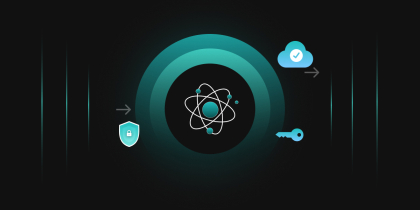Quantum computing is a field of study that focuses on the development of computer-based technologies centered around quantum theory principles. Quantum computing leverages the quantum mechanics idea of superposition. Superposition is where something, like a bit, is in two states at once. This means that quantum bits, or qubits, can be in the state of both 1 and 0 at the same time, which in turn provides much of the quantum computer’s processing power. Quantum computing offers computation miracles, solving certain mathematical problems much faster than classical computers. Some of these problems are the basis for widely used cryptographic algorithms, such as factoring large numbers and solving discrete logarithms, essential components of modern cryptography.
Post-Quantum Cryptography (PQC) is a cybersecurity landscape guardian suitable for dealing with even the most cunning adversaries, including quantum-powered criminals who lurk in the shadows. The PQC is the equivalent of James Bond in the world of counterintelligence.
NIST is the organization that standardizes compliance standards, best practices, and regulations for cyber security. NIST has set its sights on PQC standardization and led a PQC standardization project.
This project aims to prepare organizations for quantum cryptography before it becomes a real threat. This would allow companies to have the proper encryption algorithms in place throughout the organization so that once quantum computing becomes possible, these attacks can be defended against. The types of encryption algorithms the PQC standardization project is working to standardize are quantum-safe algorithms.
But which algorithms are safe and which are not?
Several robust cryptography techniques may be vulnerable to attacks by quantum computers. If we list out the algorithms that could be susceptible to quantum attack, we get to the list below:
-
RSA (Rivest–Shamir–Adleman)
This algorithm exploits the fact that large semiprime numbers are difficult to factor. Shor’s algorithm breaks RSA because it is a quantum algorithm that factors large numbers instantly.
-
DSA (Digital Signature Algorithm)
DSA is susceptible to attacks involving the discrete logarithm problem. Quantum computers could potentially solve this problem more efficiently while weakening the security of DSA.
-
ECDSA (Elliptic Curve Digital Signature Algorithm)
Similar to DSA, the security of ECDSA is based on the hardness of the elliptic curve discrete logarithm problem, which quantum computers can exploit.
-
Diffie–Hellman key exchange (and its variants)
The security of Diffie–Hellman depends on the difficulty of the discrete logarithm problem. Quantum computers can break this security assumption by using Shor’s algorithm.
Before quantum computers are used as regular day machines, predicting which algorithms will be quantum safe is a little difficult task. Algorithms that are speculated as safe from quantum computers are the following:
-
Hashes
Cryptographic hashes (like SHA2, SHA3, BLAKE2) are considered quantum-safe for now.
-
Symmetric Ciphers
Most symmetric ciphers (like AES, ChaCha20, Twofish-256, and Camellia-256) are speculated as quantum safe.
-
MAC algorithms
MAC algorithms like HMAC and CMAK are considered quantum safe.
-
Key-derivation functions (bcrypt, Scrypt, Argon2) are speculated as quantum-safe (only slightly affected by quantum computing).
How do you plan for PQC migration?
Although quantum-proof algorithms are still a subject of research and NIST has not yet released its list of recommended quantum-resistant cryptography algorithms, organizations can begin preparing themselves for quantum computers now. The following are a few different ways for organizations to keep in mind while preparing for future migration:
-
Quantum Risk Assessment
Performing a Quantum risk assessment must be any organization’s first stepping stone while migrating to PQC algorithms. A quantum risk assessment also helps create a list of applications that will be affected by the creation of quantum computers, thus providing the organization with a detailed list of applications that must be updated when moving to quantum-resistant algorithms. It also helps to identify the gap between the current cryptographic infrastructure and what needs to be implemented.
-
Critical Data Identification
After assessing the current cryptographic infrastructure, the next thing to identify is the organization’s data at risk. Determining which systems and data need to be prioritized and protected using post-quantum cryptography is very crucial.
-
Track NIST’s PQC Standardization project
Keeping track of the PQC Standardization Project, an organization can keep up to date on any changes to the quantum-resistant algorithms in the running and change to the selected algorithms when the time is right.
-
Spreading Awareness
Raising awareness among key stakeholders and employees about the importance of post-quantum cryptography and the potential impact of quantum attacks on your security posture is among the important steps to follow.
-
Crypto-Agility
The NIST has indicated that using crypto-agile solutions is a great way to begin moving towards having quantum-safe security in place. Assessing, Planning, and spreading awareness is critical, but an organization’s ability to swiftly switch between cryptographic algorithms will ensure that the organization is safe from cryptographic threats.
-
Education and Training
Invest in educating your IT and security teams about post-quantum cryptography and ensuring your staff is well-versed in the principles and best practices associated with quantum-resistant cryptographic algorithms to help the whole organization grow and prepare them for the quantum future.
-
Implement Transition Plans
Develop and implement transition plans to upgrade your organization’s cryptographic algorithms to post-quantum algorithms. Be prepared to update hardware and software systems and Public Key Infrastructure (PKI) protocols and policies to accommodate these new cryptographic algorithms.
How can Encryption Consulting Help?
In the ever-evolving landscape of cybersecurity, Encryption Consulting stands as a beacon for organizations navigating the quantum revolution. As pioneers in encryption advisory services, we specialize in orchestrating seamless transitions to Post-Quantum Cryptography (PQC) — the next frontier in secure data management.
Encryption Consulting takes great pride in our skilled consultants who can guide and assist you with encryption advisory services, including PQC migration planning, environment assessment, and customized strategy development tailored to your organization’s needs.
Conclusion
It is crucial to acknowledge the significant threat that quantum computing poses to traditional information security systems. Organizations are strongly advised to strategize and implement a robust transition to quantum-safe cryptography, proactively addressing potential quantum threats. In the interim, it is prudent to adhere to established security best practices, awaiting NIST’s formulation and release of quantum-safe standards for comprehensive guidance.




